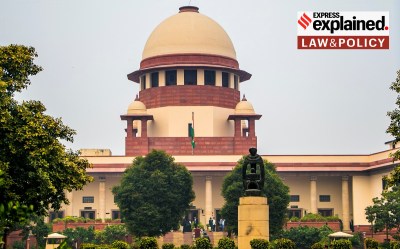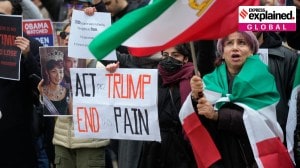The General146;s global obsession
In one of his many interviews and statements during his recent visit to Europe and the United States, General Pervez Musharraf called upon P...

In one of his many interviews and statements during his recent visit to Europe and the United States, General Pervez Musharraf called upon Pakistanis to start thinking about recognising Israel. 8216;8216;The debate should be serious. There should be no emotionalism of the extremists. What is our dispute with Israel? We should think,8217;8217; he declared.
Ironically, the General wants the nation to seriously debate a foreign policy option at the same time that he refuses open debate on his arbitrary amendments to the country8217;s Constitution. If Pakistan is to start debating issues without emotion, why must that debate be restricted only to the recognition of Israel. Why not seriously discuss whether it is right for General Musharraf to preside over the nation while still in uniform? A free debate is long overdue about the domination of one institution 8212; the military 8212; over the country8217;s political and economic life. And while Pakistanis debate what their dispute is with Israel, what is the harm in a similar debate about the continued cost of Pakistan8217;s dispute with India?
Israel is, of course, a reality and it might be in Pakistan8217;s interest to overcome ideology to recognise reality. But recognition of Israel at the present moment would do little to solve any of Pakistan8217;s pressing problems, most of which relate to regional and domestic failings. Although recognition of nations and states is a matter of international law, it can be influenced by political or religious sentiment. As a member of the United Nations and a state recognised by an overwhelming majority of states, Israel certainly qualifies for recognition under international law. Ensuring public support for a decision to recognise Israel would require political skills that General Musharraf and his team have so far not demonstrated.
The refusal of most Muslim and Arab states to recognise Israel has not diminished Israel8217;s statehood. Some would argue that it has not helped the cause of the Palestinians either. In fact, Israel alone has not caused Palestinian suffering. Between 1948 and 1967, Gaza and the West Bank, where an independent and sovereign Palestinian state is now contemplated, were under Arab-Muslim control. In the eagerness to refuse Israeli recognition, Arab and Muslim leaders made no effort to create an independent and sovereign Palestinian state in Gaza and the West Bank during those nineteen years, compounding the misery of the Palestinians. Now, with the prospect of a Palestinian state emerging as a result of US backing for a two-state solution after the end of violence and terrorism, the likelihood of Arab-Muslim recognition of Israel has increased.
Having refused recognition of Israel for over half a century, Pakistan could easily wait a little longer to be part of its collective recognition by the Arab-Islamic world. Doing so would save Pakistan from another issue of ideological polarisation within its already troubled and divided polity. Instead of initiating piecemeal debates like the one about Israeli recognition, General Musharraf would do Pakistan a greater service by addressing the more fundamental questions of who should govern Pakistan, for what purpose and how.
As a younger man, I was attracted to the notion of Pakistan as an ideological state. But over the years I have seen the failure of ideologues to practically define Pakistani ideology and witnessed the debilitating consequences of enforcing ideological paradigms on an unwilling Pakistani populace. Over the last few years, in particular, the top-down efforts at defining and forging a Pakistani national identity in ideological terms have led to terrible sectarian and jehadi violence. The overwhelming majority of Pakistanis clearly want to move on with pragmatic politics. Islam is important to Pakistanis but they are exhausted by the efforts of some to experiment with different notions of an Islamic state. Pakistan8217;s options for success and development would certainly be better as a functional democratic state, which retains its Islamic ethos through the conviction of its citizens rather than by the enforcement of conflicting theocratic visions.
The Pakistani establishment must now recognise the futility of managing its control over the state through calibrated ideological debates. It must voluntarily withdraw from manipulating and controlling the political life of the country in the name of external threats and existential security concerns. Politicians and citizens must be allowed to focus on bread and butter issues, something that would naturally happen with the coming of open democratic politics into play. Unfortunately, the Pakistani establishment does not like serious debate over social, economic or even cultural issues. Expressing concern about the domestic culture of violence invites the label of being opposed to jehad or the freedom struggle in Kashmir. Saying that retired and serving military officers are not best suited to run public sector industry or, for that matter, universities is defined as opposition to national defence. Discourse about economic policy is kept restricted to a discussion of macro-economic management instead of being extended to more fundamental questions such as the relationship of social spending and poverty to insufficient economic growth.
General Musharraf8217;s initiation of a national debate on the recognition of Israel is the result of the establishment8217;s pre-occupation with external affairs at the expense of consideration of domestic developments. The establishment8217;s scheme for Pakistan has always rested on foreign concessional funds aid, usually obtained in exchange for harmonising Pakistan8217;s foreign policy with that of donors mainly the United States. General Musharraf feels that the prospect of Israeli recognition would help thwart an impending alliance between the pro-Israeli lobby in the United States with Indian-Americans and would soften US Congressional opinion about aid to Pakistan. Having secured the promise of a 3 billion aid package for five years from the Bush administration, General Musharraf must now secure Congressional approval for financing that aid package. That tactical consideration, rather than a strategic re-appraisal of Pakistan8217;s overall direction, has prompted the sudden interest in generating 8216;8216;serious debate8217;8217; about Pakistan8217;s recognition of Israel.
In his book Peace to End All Peace, David Fromkin mentions how some anti-Semitic conspiracy theorists in the British government inadvertently influenced the Balfour declaration supporting Zionist aims in Palestine during the First World War. These British officials convinced themselves that the Young Turk government in Ottoman Turkey was covertly under the influence of the Jews. A public declaration of sympathy for Zionist objectives in Palestine was their way of weaning the Jews away from the axis powers, of which the Ottoman Empire was one. Anti-Semites in Pakistan, too, assume that the US is under Jewish influence and Israeli recognition might be the key to sustained US support for Pakistan, especially in its perennial competition with India. Instead of such circuitous reasoning, Pakistan8217;s policymakers should take a comprehensive look at Pakistan8217;s place in the world. The foundations of the country should be rebuilt on the will and consent of its citizens. Strategic ambitions should not be disproportionate to the country8217;s economic capabilities. Violent ideas, including anti-Semitism and sectarianism, should be eliminated to pave the way for a tolerant society. Governance should be subjected to rule of law and inclusive democratic politics. And a new regional strategy should give priority to better relations with each one of Pakistan8217;s immediate neighbours, rather than seeking distant allies for balances of power.
If the home front is not secured, tactical moves such as holding out the promise of Israeli recognition, will not gain Pakistan much real leverage or advantage. In fact, one of the reasons Pakistan is in such a mess today is that in the pursuit of an illusory international status, successive Pakistani governments have neglected domestic and regional considerations.
The writer is currently a visiting scholar at the Carnegie endowment for International Peace in Washington, DC. He served as adviser to Pakistani Prime Minister Nawaz Sharif and Benazir Bhutto and as ambassador to Sri Lanka
- 01
- 02
- 03
- 04
- 05































